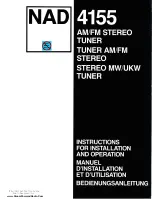
CME-5200 Digicast Media Router ASI Receiver
Revision A
IP Routing Support
MN/MRASIRCDC.IOM
first byte of the six-byte MAC address is a ‘0’. For example, 0x00 11 22 33 44 55
is a Unicast address.
Unicast is supported by the ASI-R as it would be in any routed network. Packets received
by the ASI-R are routed to the Ethernet if they meet the subnet criteria or the ASI-R is
configured to route non-local packets to a default gateway.
The ASI-R uses Classless Inter-Domain Routing (CIDR) notation in which a ‘slash’
followed by a decimal number is used to represent the number of bits for the mask; e.g.,
/32 is 255.255.255.255 and /24 is 255.255.255.0.
As stated previously, part of the route configuration is a MAC address that is assigned for
delivery of the packet when it is encapsulated into MPE. The MAC address typically
identifies the remote receiver (physical device); e.g., satellite terminal, DTV terminal, or
cable receiver.
B.2.2 Multicast
Routing
Multicast routing provides point-to-multipoint delivery of IP datagrams. Routes for
multicast IP packets are configured according to the following:
•
IP Addresses
, which fall into class D (224.0.0.0 to 239.255.255.255)
•
Medium Access Control (MAC) Addresses,
which identify the frames as
multicast. The least-significant bit of the first byte of the six-byte MAC address
is a ‘1’. For example, 0x01 00 5E 00 00 01 is a multicast address.
•
Broadcast frames
are identified by the MAC Address, 0x FF FF FF FF FF FF.
Multicast IP addresses are related to multicast MAC addresses as follows:
•
The lower 23 bits of the IP address are mapped into the lower 23 bits of the MAC
address.
Figure B-1. Multicast Mapping (IP to MAC)
Several examples of the relationship are:
•
Received IP: 239.1.1.10 = MAC: 0x01 00 5E 01 01 0A
•
Received IP: 224.10.10.10 = MAC: 0x01 00 5E 0A 0A 0A
•
Received IP: 228.63.10.10 = MAC: 0x01 00 5E 3F 0A 0A
B-2





































